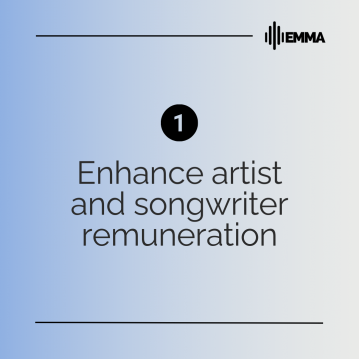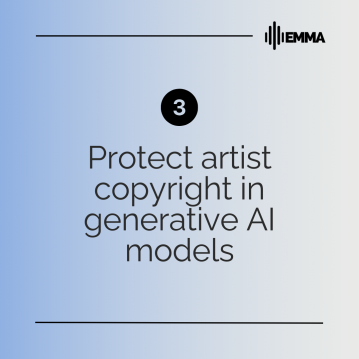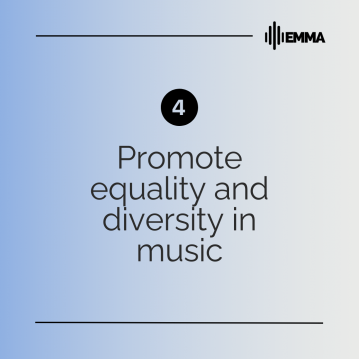As of May 2024, the European Music Managers Alliance has identified the following items as crucial policy priorities. These priorities stand at the forefront of industry challenges affecting managers and artists, from immediate concerns to overarching issues that hinder the music ecosystem’s growth.
It is imperative that the newly elected European Parliament takes decisive action on these priorities, actively involving creators, artists, and managers in the pivotal processes and developments.
1. Enhancing artist and songwriter remuneration
The current streaming economy has left many music creators struggling with financial insecurities and obstacles to career development. Meaningful changes are necessary to ensure that creators at all stages of their careers receive fair compensation for their work:
- Increased transparency alongside the development and implementation of new streaming remuneration models.
- Establishment of modern digital royalty minimums for all artists irrespective of when their contracts were signed.
- Collaboration between PRO/CMO’s and DSP’s to enhance royalty attribution accuracy and transparency.
2. Breaking down barriers to international touring
Touring and live performances are integral for artists in cultivating audiences and sustainable careers. However, various barriers exist at the European level that impede performers’ ability to tour and limit European music exports. We call for:
- Removal of double taxation and withholding tax burdens for musician’s performances, especially when the performance produces no profit.
- Reduction of costs and bureaucratic hurdles for European musicians touring outside of the EU, specifically with regards to UK & USA touring.
- Support for grassroots music venues, recognising their important cultural and economic contribution.
- Support for artists to embrace environmentally sustainable touring practices.
3. Protecting artist copyright in generative AI models
As artists and managers embrace the potential of AI – it is crucial to safeguard artist copyrights and ensure fair remuneration for the use of these copyrights in training generative AI. Establishing robust frameworks becomes essential to ensure that technological progress supports, rather than undermines, the creative sector. This includes:
- Ensuring fair remuneration and crediting for artists’ work being used in generative AI models.
- Guaranteeing artists the ability to opt-in to AI training models.
- Creating frameworks for continued protections against exploitative technological practices.
4. Promoting equality and diversity
A vibrant music industry that offers equitable support and a safe and inclusive working environment is necessary to nurture diverse talent and unlock its full potential. Through our research EMMA has found significant inequalities underscoring the necessity for proactive measures to foster diversity within the music ecosystem:
- Comprehensive funding support for emerging musicians and managers from diverse backgrounds
- Targeted research, training, mentoring and resources for managers and artists to be created and disseminated.
- Implementing policies to address and eliminate the gender pay gap.
EMMA advocates for sustained collaboration among all sector stakeholders to cultivate a thriving music ecosystem that empowers talent, allowing artists and managers to flourish, regardless of their background. We aspire to foster an environment that embraces concrete measures to generate a fairer, more transparent, more resilient, and prosperous music industry for all stakeholders involved.






